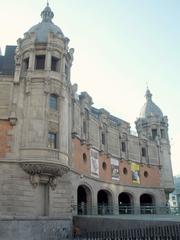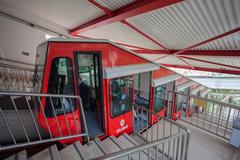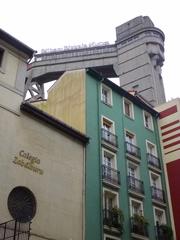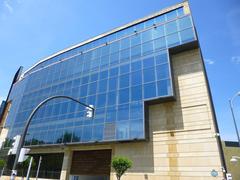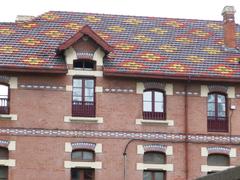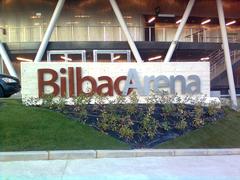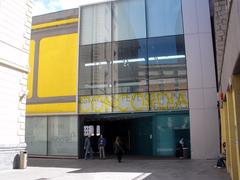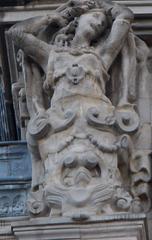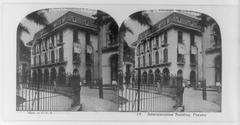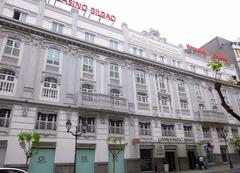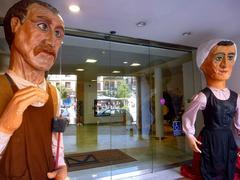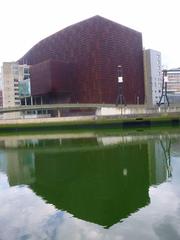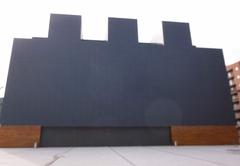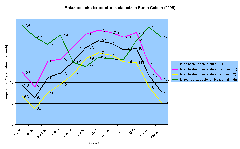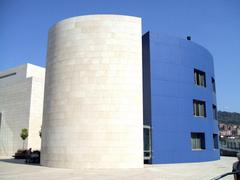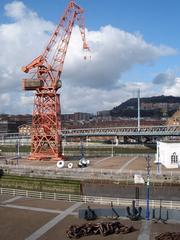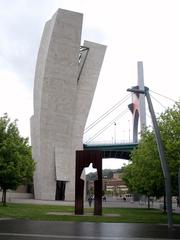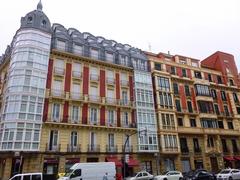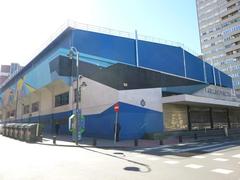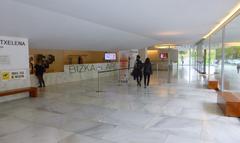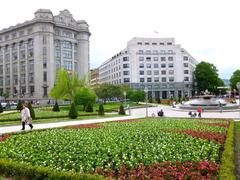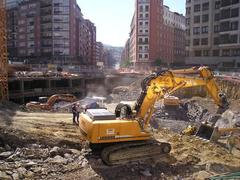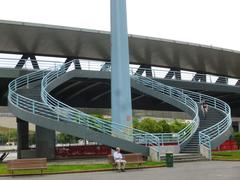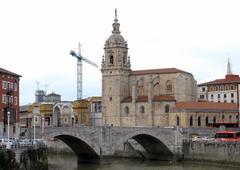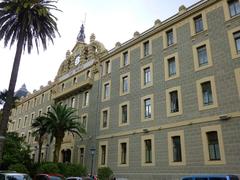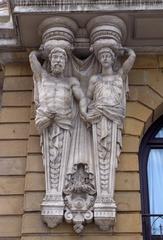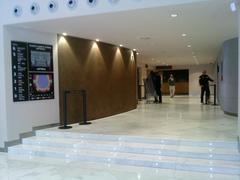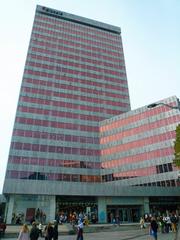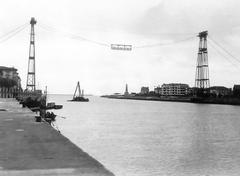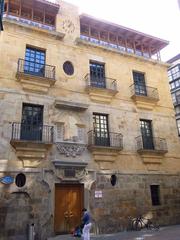
Archivo Histórico de Euskadi: Visiting Hours, Tickets, and Guide to Bilbao Historical Sites
Date: 03/07/2025
Introduction
The Archivo Histórico de Euskadi (AHE) is a landmark institution in the heart of Bilbao, dedicated to preserving and showcasing the rich documentary heritage of the Basque Country. As both an architectural marvel and a dynamic cultural center, the AHE provides a window into Euskadi’s political, social, and cultural evolution from the early 20th century to the present day. This detailed guide covers everything you need to plan your visit: opening hours, ticket information, accessibility, highlights, and practical tips for exploring one of the premier historical sites in Bilbao.
Why Visit the Archivo Histórico de Euskadi?
The AHE is not only a repository of invaluable governmental and private records—dating back to the first Basque Government in 1936—but also a vibrant cultural hub. Visitors can explore original decrees, rare photographs, family archives, and unique audiovisual materials that narrate the Basque story. The archive’s striking glass façade, a symbol of transparency and public engagement, makes it an architectural highlight within Bilbao’s Ensanche district. Its proximity to other cultural icons like the Guggenheim Museum and the Old Town further cements its role as an essential stop for any Bilbao itinerary (Euskadi.eus; Open House Bilbao).
Historical Background and Institutional Role
The AHE was established to safeguard the documentary legacy of the Basque Autonomous Community, with a special focus on records from the first Basque Government during the Spanish Civil War. Led by José Antonio Aguirre, this government was instrumental in asserting Basque autonomy. Over time, the archive’s scope expanded to include materials from public institutions, private organizations, businesses, families, and individuals—reflecting the diversity of Basque society (Fondos documentales).
The archive actively documents contemporary Basque society, preserving not only governmental documents but also personal and institutional records that highlight moments of conflict, exile, and social transformation.
Architectural Features and Sustainability
Design and Symbolism
The current AHE building, designed by the ACXT architectural studio and completed in 2013, is a standout example of contemporary architecture. Its glass façade, serigraphed with archival texts, evokes a folded sheet of paper—symbolizing the preservation and accessibility of history. The rear façade opens onto a tranquil interior garden, creating a green oasis amid Bilbao’s urban landscape (Open House Bilbao).
Inside, double-height spaces and diagonal sightlines create a sense of openness and invite visitors to explore. Public areas such as the lobby, exhibition halls, and auditorium are located on the lower levels, while upper floors house administrative offices and specialized laboratories. Deep basement levels provide secure, climate-controlled storage for the archive’s extensive collections (Artxibo.euskadi.eus; Arquitectura Viva).
Technical Innovation
The building incorporates advanced environmental systems to ensure document preservation and sustainability. Features such as enthalpy energy recovery, free cooling, and an innovative water mist fire protection system maintain optimal archival conditions. These achievements earned the AHE recognition as a finalist for the 2015 Obra del Año award (IDOM; Bilbonauta).
Collections and Research Opportunities
Scope and Highlights
The AHE’s collections span:
- Government archives from 1936 onwards
- Private and organizational records from trade unions, cultural associations, and companies
- Personal papers of key figures, including Lehendakari Leizaola and José Miguel Barandiarán
- Photographic collections, such as images of the Spanish royal family (1900–1950), Civil War photographs, and works by renowned Basque photographers
The archive’s oldest document dates to 1279, demonstrating its commitment to preserving the depth and breadth of Basque heritage (Deia).
Digital Access
The AHE offers extensive digital access through the Dokuklik portal, enabling researchers and the public to search and view millions of digitized records and images both on-site and remotely.
Visitor Experience: What to Expect
Public Spaces and Exhibitions
- Reading Room: Located on the second floor, the reading room provides a quiet, well-equipped space for document consultation. Accreditation and valid ID are required for access.
- Exhibitions: Temporary exhibitions highlight significant themes in Basque history, with bilingual (Basque and Spanish) information and select English translations.
- Guided Tours and Workshops: The AHE periodically offers guided tours and educational workshops for groups and schools. Advance booking is recommended.
Accessibility and Facilities
- Accessibility: Fully accessible for visitors with reduced mobility, with ramps, elevators, and adapted restrooms.
- Amenities: Free Wi-Fi, cloakroom, lockers, and restrooms are available.
- Languages: Staff and materials are available in Basque, Spanish, and English.
Practical Information
Location and Directions
- Address: María Díaz de Haro, 3, 48013 Bilbao, Spain
- Public Transport: Close to Indautxu and San Mamés metro stations, tram and bus lines. Limited underground parking is available (Deia).
Opening Hours
- Monday to Thursday: 9:00 AM – 4:00 PM
- Friday: 9:00 AM – 2:00 PM
- Summer (June–September): Monday to Friday, 9:00 AM – 2:00 PM
- Closed: Weekends and public holidays
- Tip: Always check the official website for current schedules and holiday closures.
Admission and Tickets
- Entry: Free for all visitors. Access to original documents or research areas requires accreditation and prior booking.
- Special Services: Some services (document reproduction, group tours) may incur a fee.
Visitor Rules
- Registration with valid ID is required for the reading room.
- Bags and coats may need to be stored in available lockers.
- Photography is permitted only in designated areas—ask staff for guidelines.
Nearby Attractions
Enhance your cultural experience by visiting these nearby Bilbao highlights:
- Guggenheim Museum Bilbao: World-renowned for contemporary art and architecture.
- Casco Viejo (Old Town): Lively historic quarter with shops, cafes, and Basque cuisine.
- Fine Arts Museum: Notable collection of Spanish and European art.
- Ría de Bilbao: Pleasant riverside walks with city views.
Frequently Asked Questions (FAQ)
Do I need a ticket to visit the Archivo Histórico de Euskadi?
No, entry is free; some specialized services may have fees.
What are the visiting hours?
Generally Monday to Friday, with reduced summer hours. Check the official website for updates.
Is the archive accessible for people with disabilities?
Yes, the building is fully accessible.
Can I take photographs inside?
Photography is generally restricted to authorized areas. Always confirm with staff.
Do I need to register to access the reading room?
Yes, registration with valid ID is required.
Plan Your Visit
The Archivo Histórico de Euskadi offers an immersive journey into Basque heritage, blending innovative architecture, rich collections, and a welcoming visitor experience. Whether you are a researcher, student, or curious traveler, the AHE stands as a dynamic cultural hub in Bilbao’s vibrant landscape.
- Visit the official website for the latest updates, digital resources, and guided tour schedules.
- Explore the Dokuklik portal for online access to digitized archives.
- Discover more Bilbao attractions in our related guides: Top 10 Historical Sites to Visit in Bilbao and Guide to Bilbao Museums and Cultural Centers.
Stay connected with the archive’s community via social media and enhance your visit with the Audiala app for personalized tours and event updates.
Visual Suggestions
- High-resolution images of the glass façade (alt: “Archivo Histórico de Euskadi glass façade with archival texts”)
- Interior views of the reading room and public spaces
- Map showing the archive’s central location in Bilbao
- Screenshots of the Dokuklik digital portal interface
Citations and Further Reading
- Archivo Histórico de Euskadi – Euskadi.eus
- Open House Bilbao – Archivo Histórico de Euskadi
- Fondos documentales – Artxibo Euskadi
- Deia Article on Archivo Histórico de Euskadi


